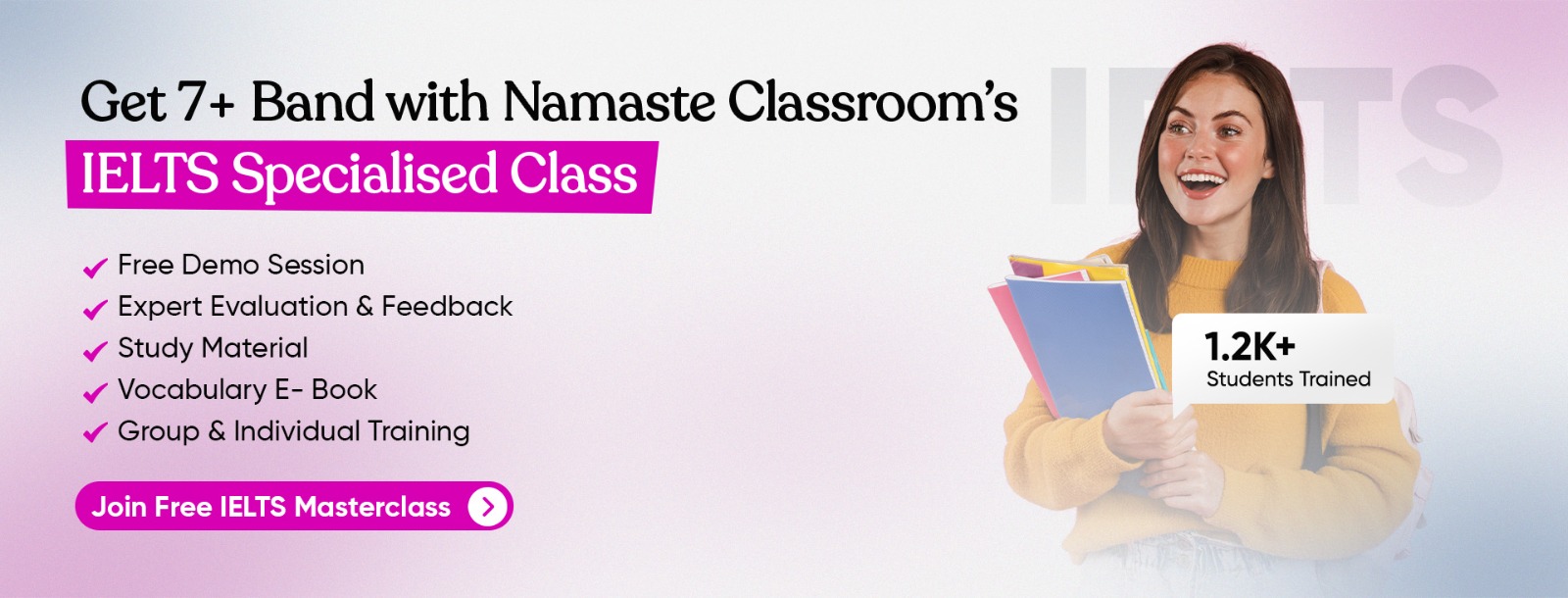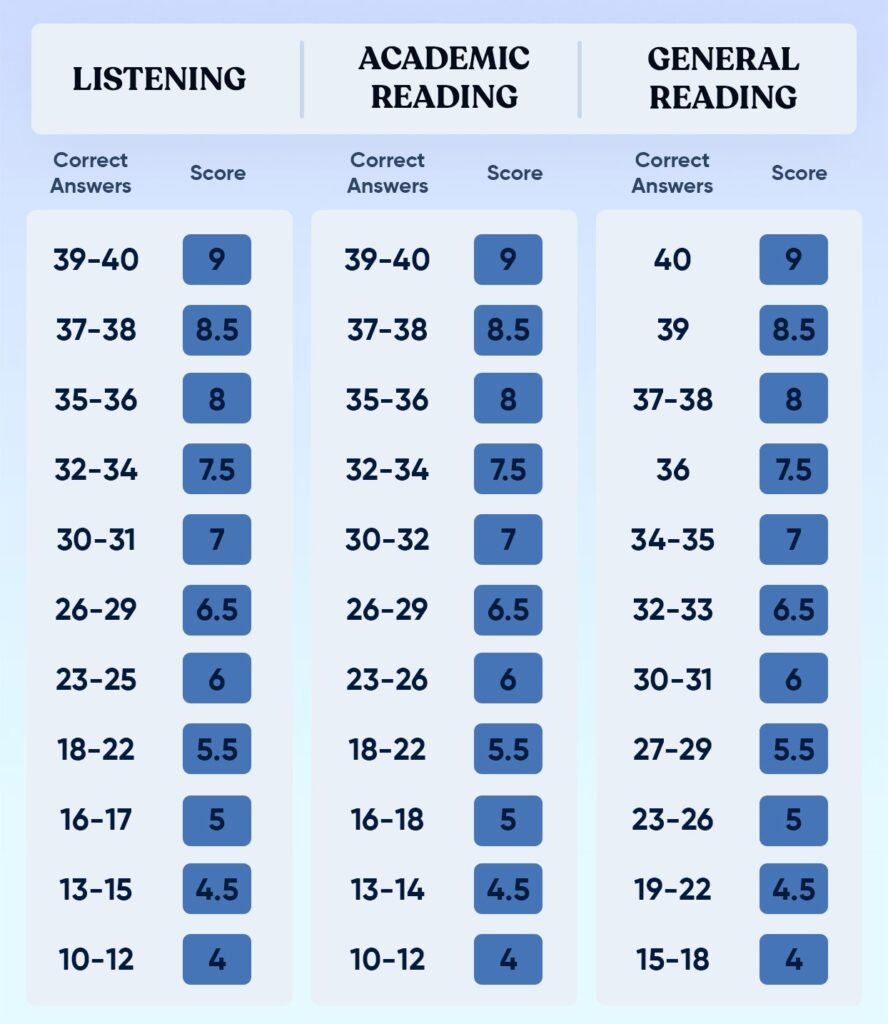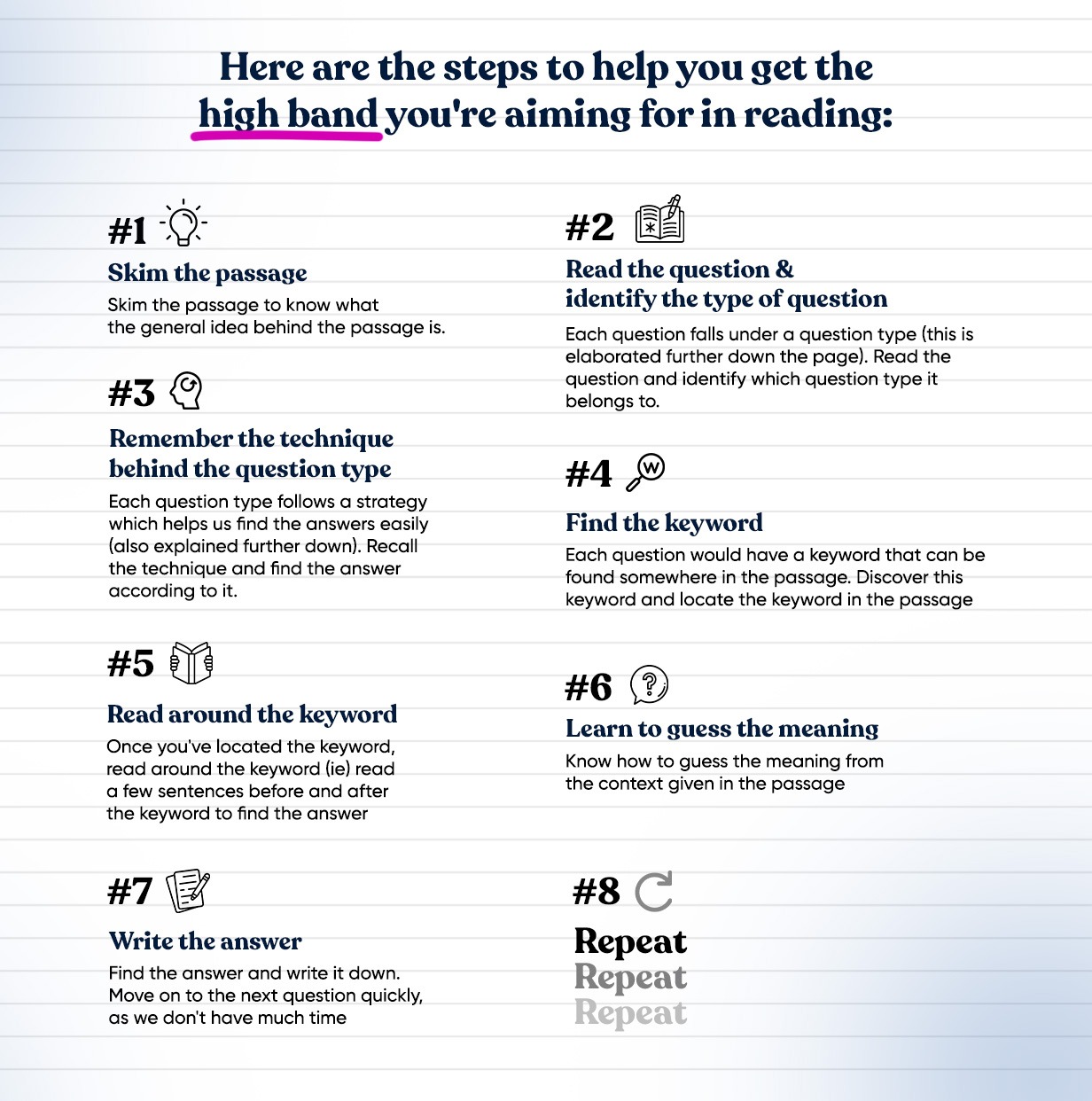IELTS READING TEST
Your Complete Guide to Success
The IELTS Reading Test is an important part of both the Academic and General Training modules. This 60-minute test checks your ability to grasp, interpret, and analyse many sorts of texts, making it an important step toward attaining your target band score—whether you’re studying for an academic degree, advancing your career, or applying for immigration.
The test challenges your reading abilities with a range of question forms and tough sections. While both modules have the same structure and scoring, their content differs:

Academic Reading
Includes three lengthy, in-depth excerpts taken from books, journals, and research reports. These readings are more formal and scholarly in tone, and they test your ability to comprehend complicated concepts and arguments.
General Reading
Concentrates on ordinary, practical materials such as advertising, user manuals, and job paperwork. These passages test your abilities to extract important information and understand real-world writings.
Understanding the specifics of the IELTS Reading test style is critical for success. Whether you want to get a high band score for university admission, a dream job, or to meet immigration criteria, mastering the Reading test is essential.
To maximize your performance, practice using a variety of reading materials and techniques such as skimming, scanning, and paraphrasing.
Summarise
Duration for Reading Module : 60 minutes
Number of Questions : 40 ( 3 Sections )
Marking Criteria : Each correct answer receives 1 mark. Your final score is given as a band score from 1–9 in whole or half bands, e.g. 4 or 6.5. There is no negative marking for wrong answers.
IELTS Writing
More IELTS Modules
Spoken English Courses
Download IELTS Brochure
IELTS Reading Module
Academic Module
- 60 Minutes
- 40 Questions
- Three long reading passages with tasks
- Text range from descriptive and factual to discursive and analytical.
- Includes non-verbal material such as diagrams or illustrations.
- Texts are authentic (e.g. taken from books, journals and news papers)
General Training Module
- 60 Minutes
- 40 Questions
- Three reading passages with tasks
- Sections one contains two or three short factual texts.
- Section two contain 2 short, work related factual texts
- Section three contains one longer text on a topic of general interest.
- Texts are authentic (e.g. taken from company handbooks, official documents books and newspapers)
IELTS READING QUESTION TYPES :
| QUESTION TYPE | DESCRIPTION |
|---|---|
| IELTS Multiple-Choice Questions |
|
| IELTS True/False/Not Given | Based on statements:
|
| IELTS Yes/No/Not Given |
|
| IELTS Matching Headings |
|
| IELTS Matching Information |
|
| IELTS Matching Features |
|
| IELTS Matching Sentence Endings |
|
| IELTS Sentence Completion & Short Answer Questions |
|
| IELTS Note, Table, Diagram & Summary Completion Questions |
|
Note: Because of the little difference in difficulty level, the IELTS Academic reading band score and the IELTS General Reading band score are calculated slightly differently.
Determine your IELTS band score for the Academic and General using the score table provided below.

Tips for Excelling in the IELTS Reading Module
| S.No. | Tip | Description |
|---|---|---|
| 1 | Learn the Test Format | Familiarize yourself with text types and question formats to avoid surprises and manage time better. |
| 2 | Understand Question Types | Practice all 14 question types; read questions first, then scan passages to locate answers efficiently. |
| 3 | Use Skimming and Scanning | Skim for the main idea and scan for specific details to find answers quickly and accurately. |
| 4 | Leverage Context Clues | Use surrounding words to understand unfamiliar vocabulary and comprehend passages effectively. |
| 5 | Manage Time Wisely |
|
| 6 | Build Vocabulary | Learn synonyms and paraphrasing techniques to understand passages and questions better. |
| 7 | Transfer Answers Immediately | Quickly transfer answers to the answer sheet after each passage to avoid last-minute errors.
|
| 8 | Practice Regularly | Improve speed and accuracy by reading lengthy texts and completing sample tests from reliable sources. |
This concise format makes the tips easy to understand and follow for IELTS candidates. Let me know if you’d like to expand any section!
Skimming and Scanning: Essential IELTS Reading Techniques
| Technique | Description | Purpose | Example |
|---|---|---|---|
| Skimming | Quickly reading a text to grasp the main idea or theme of the passage. | Understand the overall concept or subject. | Skim headings, subheadings, and the first few sentences of each paragraph to get the gist. |
| Scanning | Rapidly searching the text for specific details like names, dates, or numbers. | Locate precise information efficiently. | Scan the passage to find a year mentioned in response to a question about historical events |

How to Use Skimming and Scanning in IELTS Reading:
Skimming Steps:
- Start by reading the title, headings, and any highlighted words.
- Quickly glance through the first and last sentences of paragraphs.
- Identify the general idea without focusing on details.
Scanning Steps:
- Read the question carefully to know what specific information you’re looking for.
- Use keywords from the question to locate relevant sections in the text.
- Look for numbers, dates, names, or specific phrases to answer accurately.
Download Sample E-Book
NC IELTS (General Training) Sample
NC Reading Academic Sample E-Book
FAQs
What’s the format of the IELTS Reading test?
The IELTS Reading section lasts 60 minutes and consists of 40 questions. It tests your ability to understand different texts, assess main ideas, and locate specific details.
How can I effectively boost my IELTS Reading score?
Consistent practice is the key. Diversify your reading materials, build a robust vocabulary, and focus on identifying main ideas and supporting details. With our expert guidance at Namaste Classrooms, you’ll receive tailored practice sessions and feedback to target your specific needs.
How does IELTS Academic Reading differ from General Reading?
IELTS Academic Reading features longer, more complex passages with advanced vocabulary—ideal for those aiming for higher education. In contrast, General Reading covers everyday topics in simpler language, which might cater to practical, life-based contexts.
What time management strategies work best during the IELTS test?
Time management is crucial. Start by practicing with timed sample tests. Learn to quickly skip or mark more challenging questions to revisit later. This approach ensures you cover all sections without feeling rushed.
Are dictionaries allowed during the IELTS Reading test?
No, dictionaries are strictly prohibited during the exam. That’s why it’s important to build your vocabulary before test day so that you can confidently decipher unfamiliar words on the fly.
How can Namaste Classrooms help me excel in IELTS Reading?
We offer comprehensive courses with experienced trainers, personalized feedback, and regular practice tests. Our approach helps you understand your strengths and weaknesses—making your preparation targeted and effective.
What are the most common question types in IELTS Reading?
You can expect multiple-choice questions, matching headings or statements, sentence completions, and summary completions. Each type challenges a different aspect of your reading comprehension skills.
What How do I quickly identify the main idea of a passage?are the most common question types in IELTS Reading?
Look for key hints in introductory paragraphs, headings, or topic sentences. These elements often reveal the central theme of the passage, letting you focus on essential content rather than every detail
What roles do skimming and scanning play in the test?
helps you understand the overall gist of a passage, while scanning is all about pinpointing specific details. Practicing both improves speed and accuracy, which is crucial for the timed exam.
Can I draw on my personal experiences when answering the questions?
No—answers must be based solely on the information provided in the text. The exam is designed to test your ability to interpret and analyze written material objectively.
What should I do when I encounter unfamiliar vocabulary?
Rely on context clues from surrounding sentences to guess the meaning. This strategy improves with practice, so you become adept at decoding tough words without external help.
Am I allowed to write notes or underline the text during the exam?
Unfortunately, no markings are allowed on the question paper. Instead, develop mental note-taking techniques during practice to keep track of crucial points.
How can I use the process of elimination to my advantage?
Eliminate answers that clearly do not match the text. This strategy narrows your choices, giving you a better chance of selecting the right answer even when the question seems tricky.
Why is understanding the author’s purpose important?
Grasping whether the author’s goal is to inform, persuade, or entertain helps you identify the tone and nuance of the text, critical for accurately answering inference-based questions.
What should I do when I encounter unfamiliar vocabulary?
Rely on context clues from surrounding sentences to guess the meaning. This strategy improves with practice, so you become adept at decoding tough words without external help.
What distinguishes a summary completion from a sentence completion question?
Summary completion questions require you to fill in gaps in a cohesive overview of the passage, whereas sentence completion demands that you complete individual sentences with context-specific words.
How can I boost my reading speed without sacrificing comprehension?
Regular timed practice is essential. Start by skimming for the overall message and then revisit details as needed. This approach not only improves speed but also solidifies your understanding.
Is it permissible to mark the text with a highlighter or pen?
No marks or annotations are allowed on the paper during the exam. Train your brain to capture and retain information without relying on physical markings.
How does inference affect your performance on IELTS Reading?
Many questions require you to draw conclusions from subtle hints in the text. Strengthening your inference skills through varied practice sessions can significantly enhance your performance.
What’s a good strategy for handling complex sentence structures?
Break down intricate sentences into simpler parts. Identify the main clause first, then work through additional details. This method clarifies meaning and prevents you from getting overwhelmed.
Can I ask the examiner for clarification during the test?
No, exam conditions do not permit any clarifications. That’s why thorough practice is essential to familiarize yourself with all instructions and question formats ahead of time.
How can the question stem help me during the exam?
The question stem often contains clues about what information to look for. Use these hints to more effectively locate relevant details in the passage.
Why is it useful to understand the structure of a passage?
Recognizing how a passage is organized—introduction, body, conclusion—can help you quickly navigate long texts and locate critical information with ease.
In what way can my grammar knowledge assist in this section?
A solid understanding of grammar helps you parse sentence constructions correctly, clarifying meaning and supporting the process of answering questions accurately based on the passage.
How can I better detect the author’s tone and attitude?
Engage in active reading by paying attention to word choice, punctuation, and stylistic cues. Over time, these observations will help you discern subtle shifts in tone and perspective.
What’s the difference between matching and multiple-choice questions?
Matching questions require you to pair related pieces of information from the text, while multiple-choice questions ask you to select the best answer from several options. Each format tests different aspects of reading comprehension.
How does Namaste Classrooms prepare me for IELTS Reading?
We provide a comprehensive preparation program—including expert-led practice sessions, detailed feedback, and a range of practice materials—that’s specifically designed to address the unique challenges of the IELTS Reading test.
What are the benefits of choosing Namaste Classrooms for my IELTS preparation?
With a team of seasoned trainers, engaging content, and a personalized approach, Namaste Classrooms not only helps you improve your skills but also builds the confidence you need to succeed on test day.
How do I maintain motivation throughout my IELTS Reading practice?
Set clear, achievable goals and track your progress regularly. Celebrate small victories along the way, and remember that consistent effort leads to improvement. A positive mindset, along with structured practice, is your best ally on this journey.
